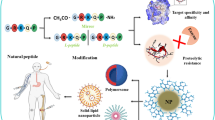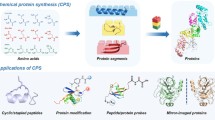Abstract
α-Peptoids as well as peptide/α-peptoid hybrids and peptide/β-peptoid hybrids constitute major classes of proteolytically stable peptidomimetics that have been extensively investigated as mimetics of biologically active peptides. Representatives of lipidated peptide/β-peptoid hybrids have been identified as promising immunomodulatory lead compounds, and hence access to these via protocols suitable for gram-scale synthesis is warranted to enable animal in vivo studies. Recent observations indicated that several byproducts appear in crude mixtures of relatively short benzyl-based peptide/β-peptoid oligomers, and that these were most predominant when the β-peptoid units displayed an α-chiral benzyl side chain. This prompted an investigation of their stability under acidic conditions. Simultaneous deprotection and cleavage of peptidomimetics containing either α-chiral α- or β-peptoid residues required treatment with strong acid only for a short time to minimize the formation of partially debenzylated byproducts. The initial work on peptide/β-peptoid oligomers with an alternating design established that it was beneficial to form the amide bond between the carboxyl group of the α-amino acid and the congested amino functionality of the β-peptoid residue in solution. To further simplify oligomer assembly on solid phase, we now present a protocol for purification-free solid-phase synthesis of tetrameric building blocks. Next, syntheses of peptidomimetic ligands via manual solid-phase methodologies involving tetrameric building blocks were found to give more readily purified products as compared to those obtained with dimeric building blocks. Moreover, the tetrameric building blocks could be utilized in automated synthesis with microwave-assisted heating, albeit the purity of the crude products was not increased.







Similar content being viewed by others
References
Bacsa B, Horvati K, Bosze S, Andreae F, Kappe CO (2008) Solid-phase synthesis of difficult peptide sequences at elevated temperatures: a critical comparison of microwave and conventional heating technologies. J Org Chem 73:7532–7542. https://doi.org/10.1021/jo8013897
Bang JK, Nan YH, Lee EK, Shin SY (2010) A novel Trp-rich model antimicrobial peptoid with increased protease stability. Bull Korean Chem Soc 31:2509–2513. https://doi.org/10.5012/bkcs.2010.31.9.2509
Birtalan E, Rudat B, Kölmel DK, Fritz D, Vollrath SBL, Schepers U, Bräse S (2011) Investigating rhodamine B-labeled peptoids: scopes and limitations of its applications. Biopolymers 96:694–701. https://doi.org/10.1002/bip.21617
Bolt HL, Eggimann GA, Jahoda CAB, Zuckermann RN, Sharples GJ, Cobb SL (2017) Exploring the links between peptoid antibacterial activity and toxicity. MedChemComm 8:886–896. https://doi.org/10.1039/C6MD00648E
Bonke G, Vedel L, Witt M, Jaroszewski JW, Olsen CA, Franzyk H (2008) Dimeric building blocks for solid-phase synthesis of α-peptide–β-peptoid chimeras. Synthesis 2008(15):2381–2390. https://doi.org/10.1055/s-2008-1067171
Chongsiriwatana NP, Patch JA, Czyzewski AM, Dohm MT, Ivankin A, Gidalevitz D, Zuckermann RN, Barron AE (2008) Peptoids that mimic the structure, function, and mechanism of helical antimicrobial peptides. Proc Natl Acad Sci USA 105:2794–2799. https://doi.org/10.1073/pnas.0708254105)
de la Torre BG, Jakab A, Andreu D (2007) Polyethyleneglycol-based resins as solid supports for the synthesis of difficult or long peptides. Int J Pept Res Ther 13:265–270. https://doi.org/10.1007/s10989-006-9077-5
Eggenberger K, Birtalan E, Schröder T, Bräse S, Nick P (2009) Passage of Trojan peptoids into plant cells. ChemBioChem 10:2504–2512. https://doi.org/10.1002/cbic.200900331
Findlay B, Szelemej P, Zhanel GG, Schweizer F (2012) Guanidylation and tail effects in cationic antimicrobial lipopeptoids. PLoS One 7:e41141. https://doi.org/10.1371/journal.pone.0041141
Forsman H, Andréasson E, Karlsson J, Boulay F, Rabiet MJ, Dahlgren C (2012) Structural characterization and inhibitory profile of formyl peptide receptor 2 selective peptides descending from a PIP2-binding domain of gelsolin. J Immunol 189:629–637. https://doi.org/10.4049/jimmunol.1101616
Fowler SA, Blackwell HE (2009) Structure–function relationships in peptoids: recent advances toward deciphering the structural requirements for biological function. Org Biomol Chem 7:1508–1524. https://doi.org/10.1039/B817980H
Fowler SA, Luechapanichkul R, Blackwell HE (2009) Synthesis and characterization of nitroaromatic peptoids: fine tuning peptoid secondary structure through monomer position and functionality. J Org Chem 74:1440–1449. https://doi.org/10.1021/jo8023363
Garcia-Martin F, Quintanar-Audelo M, Garcia-Ramos Y, Cruz LJ, Gravel C, Furic R, Côte S, Tulla-Puche J, Albericio F (2006) ChemMatrix, a poly(ethylene glycol)-based support for the solid-phase synthesis of complex peptides. J Comb Chem 8:213–220. https://doi.org/10.1021/cc0600019
Goodson B, Ehrhardt A, Ng S, Nuss J, Johnson K, Giedlin M, Yamamoto R, Moos WH, Krebber A, Ladner M, Giacone MB, Vitt C, Winter J (1999) Characterization of novel antimicrobial peptoids. Antimicrob Agents Chemother 43:1429–1434. https://doi.org/10.1128/AAC.01080-10
Gorske BC, Blackwell HE (2006) Tuning peptoid secondary structure with pentafluoroaromatic functionality: a new design paradigm for the construction of discretely folded peptoid structures. J Am Chem Soc 128:14378–14387. https://doi.org/10.1021/ja065248o
Hamper BC, Kolodziej SA, Scatez AM, Smith RG, Cortez E (1998) Solid phase synthesis of β-peptoids: N-substituted β-aminopropionic acid oligomers. J Org Chem 63:708–718. https://doi.org/10.1021/jo971675w
Hansen PR, Munk JK (2013) Synthesis of antimicrobial peptoids. Methods Mol Biol 1047:151–159. https://doi.org/10.1007/978-1-62703-544-6_11
Hein-Kristensen L, Knapp KM, Franzyk H, Gram L (2011) Bacterial membrane activity of α-peptide/β-peptoid chimeras: influence of amino acid composition and chain length on the activity against different bacterial strains. BMC Microbiol 11:144. https://doi.org/10.1186/1471-2180-11-144
Holdfeldt A, Skovbakke SL, Winther M, Gabl M, Nielsen C, Perez-Gassol I, Larsen CJ, Wang JM, Karlsson A, Dahlgren C, Forsman H, Franzyk H (2016) The lipidated peptidomimetic Lau-((S)-Aoc)-(Lys-βNphe)6-NH2 is a novel formyl peptide receptor 2 agonist that activates both human and mouse neutrophil NADPH oxidase. J Biol Chem 291:19888–19899. https://doi.org/10.1074/jbc.M116.736850
Jahnsen RD, Frimodt-Møller N, Franzyk H (2012) Antimicrobial activity of peptidomimetics against multidrug-resistant Escherichia coli: a comparative study of different backbones. J Med Chem 55:7253–7261. https://doi.org/10.1021/jm300820a
Jahnsen RD, Haney EF, Franzyk H, Hancock REW (2013) Characterization of a proteolytically stable multifunctional host defense peptidomimetic. Chem Biol 20:1286–1295. https://doi.org/10.1016/j.chembiol.2013.09.007
Jahnsen RD, Sandberg-Schaal A, Vissing KJ, Nielsen HM, Frimodt-Møller N, Franzyk H (2014) Tailoring cytotoxicity of antimicrobial peptidomimetics with high activity against multidrug-resistant Escherichia coli. J Med Chem 57:2864–2873. https://doi.org/10.1021/jm401335p
Kim J-K, Lee S-A, Shin S, Lee J-Y, Jeong K-W, Nan YH, Park YS, Shin SY, Kim Y (2010) Structural flexibility and the positive charges are the key factors in bacterial cell selectivity and membrane penetration of peptoid-substituted analog of piscidin 1. Biochim Biophys Acta 1798:1913–1925. https://doi.org/10.1016/j.bbamem.2010.06.026
Kirshenbaum K, Barron AE, Goldsmith RA, Armand P, Bradley EK, Truong KTV, Dill KA, Cohen FE, Zuckermann RN (1998) Sequence-specific polypeptoids: a diverse family of heteropolymers with stable secondary structure. Proc Natl Acad Sci USA 95:4303–4308. https://doi.org/10.1073/pnas.95.8.4303
Kruijtzer JAW, Hofmeyer LJF, Heerma W, Versluis C, Liskamp RMJ (1998) Solid-phase syntheses of peptoids using Fmoc-protected N-substituted glycines: the synthesis of (retro) peptoids of Leu-enkephalin and substance P. Chem Eur J 4:1570–1580. https://doi.org/10.1002/(SICI)1521-3765(19980807)4:8%3c1570:AID-CHEM1570%3e3.0.CO;2-2
Lin H, Yan TT, Wang L, Guo FF, Ning GS, Xiong M (2016) Statistical design, structural analysis, and in vitro susceptibility assay of antimicrobial peptoids to combat bacterial infections. J Chemometr 30:369–376. https://doi.org/10.1002/cem.2801
Liu Y, Knapp KM, Yang L, Molin S, Franzyk H, Folkesson A (2013) High in vitro antimicrobial activity of β-peptoid-peptide hybrid oligomers against planktonic and biofilm cultures of Staphylococcus epidermidis. Int J Antimicrob Agents 41:20–27. https://doi.org/10.1016/j.ijantimicag.2012.09.014
Mojsoska B, Jenssen H (2015) Peptides and peptidomimetics for antimicrobial drug design. Pharmaceuticals 8:366–415. https://doi.org/10.3390/ph8030366
Mojsoska B, Zuckermann RN, Jenssen H (2015) Structure-activity relationship study of novel peptoids that mimic the structure of antimicrobial peptides. Antimicrob Agents Chemother 59:4112–4120. https://doi.org/10.1128/AAC.00237-15
Molchanova N, Hansen PR, Franzyk H (2017) Advances in development of antimicrobial peptidomimetics as potential drugs. Molecules 22:1430. https://doi.org/10.3390/molecules22091430
Norgren AS, Zhang S, Arvidsson PI (2006) Synthesis and circular dichroism spectroscopic investigations of oligomeric β-peptoids with α-chiral side chains. Org Lett 8:4533–4536. https://doi.org/10.1021/ol061717f
Olsen CA (2010) Peptoid-peptide hybrid backbone architectures. ChemBioChem 11:152–160. https://doi.org/10.1002/cbic.200900618
Olsen CA, Lambert M, Witt M, Franzyk H, Jaroszewski JW (2008) Solid-phase peptide synthesis and circular dichroism study of chiral β-peptoid homooligomers. Amino Acids 34:465–471. https://doi.org/10.1007/s00726-007-0546-8
Rothbard JB, Kreider E, Pattabiraman K, Pelkey ET, VanDeusen CL, Wright L, Wylie BL, Wender PA (2002) Arginine-rich molecular transporters for drugs: the role of backbone and side chain variations on cellular uptake. In: Langel Ü (ed) Cell-penetrating peptides: processes and applications. CRC Press LLC, Boca Raton, pp 142–160
Ryge TS, Frimodt-Møller N, Hansen PR (2008) Antimicrobial activities of twenty lysine-peptoid hybrids against clinically relevant bacteria and fungi. Chemotherapy 54:152–156. https://doi.org/10.1159/000119707
Schröder T, Niemeier N, Afonin S, Ulrich AS, Krug HF, Bräse S (2008) Peptoidic amino- and guanidinium-carrier systems: targeted drug delivery into the cell cytosol or the nucleus. J Med Chem 51:376–379. https://doi.org/10.1021/jm070603m
Shin SY (2014) Effect of double replacement of L-pro, D-pro, D-leu or Nleu in hydrophobic face of amphipathic α-helical model antimicrobial peptide on structure, cell selectivity and mechanism of action. Bull Korean Chem Soc 35:3267–3274. https://doi.org/10.5012/bkcs.2014.35.11.3267
Shuey SW, Delaney WJ, Shah MC, Scialdone MA (2006) Antimicrobial β-peptoids by a block synthesis approach. Bioorg Med Chem Lett 16:1245–1248. https://doi.org/10.1016/j.bmcl.2005.11.075
Simon RJ, Kania RS, Zuckermann RN, Huebner VD, Jewell DA, Banville S, Ng S, Wang L, Rosenberg S, Marlowe CK (1992) Peptoids: a modular approach to drug discovery. Proc Natl Acad Sci USA 89:9367–9371. https://doi.org/10.1073/pnas.89.20.9367
Skovbakke SL, Heegaard PMH, Larsen CJ, Franzyk H, Forsman H, Dahlgren C (2015a) The proteolytically stable peptidomimetic Pam-(Lys-βNSpe)6-NH2 selectively inhibits human neutrophil activation via formyl peptide receptor 2. Biochem Pharmacol 93:182–195. https://doi.org/10.1016/j.bcp.2014.11.004
Skovbakke SL, Larsen CJ, Heegaard PMH, Moesby L, Franzyk H (2015b) Lipidated α-peptide/β-peptoid hybrids with potent antiinflammatory activity. J Med Chem 58:801–813. https://doi.org/10.1021/jm501341h
Skovbakke SL, Winther M, Gabl M, Holdfeldt A, Linden S, Wang JM, Dahlgren C, Franzyk H, Forsman H (2016) The peptidomimetic Lau-(Lys-βNSpe)6-NH2 antagonizes formyl peptide receptor 2 expressed in mouse neutrophils. Biochem Pharmacol 119:56–65. https://doi.org/10.1016/j.bcp.2016.09.004
Skovbakke SL, Holdfeldt A, Nielsen C, Hansen AM, Perez-Gassol I, Dahlgren C, Forsman H, Franzyk H (2017) Combining elements from two antagonists of formyl peptide receptor 2 generates more potent peptidomimetic antagonists. J Med Chem 60:6991–6997. https://doi.org/10.1021/acs.jmedchem.7b00489
Stanzl EG, Trantow BM, Vargas JR, Wender PA (2013) Fifteen years of cell-penetrating, guanidinium-rich molecular transporters: basic science, research tools, and clinical applications. Acc Chem Res 46:2944–2954. https://doi.org/10.1021/ar4000554
Wu CW, Sanborn TJ, Zuckermann RN, Barron AE (2001) Peptoid oligomers with α-chiral, aromatic side chains: effects of chain length on secondary structure. J Am Chem Soc 123:2958–2963. https://doi.org/10.1021/ja003153v
Zuckermann RN (2011) Peptoid origins. Pept Sci 96:545–555. https://doi.org/10.1002/bip.21573
Zuckermann RN, Kodadek T (2009) Peptoids as potential therapeutics. Curr Opin Mol Ther 11:299–307
Zuckermann RN, Kerr JM, Kent SBH, Moos WH (1992) Efficient method for the preparation of peptoids (oligo(N-substituted glycines)) by submonomer solid-phase synthesis. J Am Chem Soc 114:10646–10647. https://doi.org/10.1021/ja00052a076
Acknowledgements
We acknowledge Birgitte Simonsen for the purification of peptidomimetics. NMR equipment used in this work was purchased via Grant No. 10-085264 from The Danish Research Council for Independent Research|Nature and Universe.
Author information
Authors and Affiliations
Corresponding author
Ethics declarations
Conflict of interest
The authors declare that they have no conflict of interest.
Informed consent
All authors listed have contributed to conception, design, synthesis, gathering, analysis, or interpretation of data, and have contributed to the writing and intellectual content of the article. All authors gave informed consent to the submission of this manuscript.
Additional information
Handling Editor: F. Albericio.
Electronic supplementary material
Below is the link to the electronic supplementary material.
Rights and permissions
About this article
Cite this article
Hansen, A.M., Skovbakke, S.L., Christensen, S.B. et al. Studies on acid stability and solid-phase block synthesis of peptide–peptoid hybrids: ligands for formyl peptide receptors. Amino Acids 51, 205–218 (2019). https://doi.org/10.1007/s00726-018-2656-x
Received:
Accepted:
Published:
Issue Date:
DOI: https://doi.org/10.1007/s00726-018-2656-x




